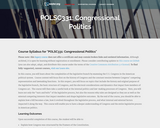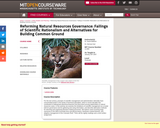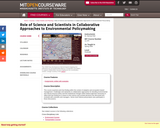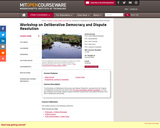
In this course, the student will learn about the complexities of the legislative branch by examining the U.S. Congress in the American political system. This course will focus first on the history of Congress and the tension between Congress' competing representation and lawmaking functions by examining the structure of Congress, its original purpose, and the factors that influence how members of Congress act. The course will then take a careful look at the internal politics and law-making processes of Congress by learning the external competing interests that shape legislative outcomes and why Congressional rules are designed as they are. Upon successful completion of this course, the student will be able to: explain how Congress was structured by the Framers of the Constitution; discuss how Congress is shaped by the U.S. Constitution; demonstrate an understanding of the importance of bicameralism in a representative body; compare and contrast features of the House and the Senate; explain the evolution of Congress as a modern institution; explain how congressional candidates run for office; discuss the importance of political parties in the recruitment of congressional candidates; identify the advantages and disadvantages of incumbency; define reapportionment and redistricting; assess the role of money and fundraising in congressional elections; compare and contrast how members of Congress fulfill their duties in their home districts and in Washington D.C; compare and contrast the leadership systems used in the House and Senate; describe the roles and functions of legislative leaders and political parties in Congress; name and describe the various types of congressional committees; explain why the committee system is central to an understanding of the legislative process; describe the major steps in a bill becoming a law; evaluate the influence of constituents, colleagues, political parties, and interest groups on congressional decision-making; assess the relationship between Congress and the president and its many permutations over time; analyze the pros and cons of united and divided government; explain the influence of the presidency on congressional elections; discuss the role of congressional oversight as it relates to both the presidency and the bureaucracy; identify the role played by Congress as it relates to the judicial branch; analyze the complicated relationship that exists between members of Congress and the media; analyze the role and performance of Congress in the budgetary process, economic policy, and foreign policy; explain the complications that arise as a result of shared foreign policy powers between Congress and the president; discuss how congressional policymaking has responded to post-9/11 governance; discuss the criticism of Congress, and assess the methods put forth to reform the institution. (Political Science 331)
- Subject:
- Political Science
- Social Science
- Material Type:
- Assessment
- Full Course
- Homework/Assignment
- Lecture
- Lecture Notes
- Reading
- Syllabus
- Provider:
- The Saylor Foundation
- Date Added:
- 04/29/2019


